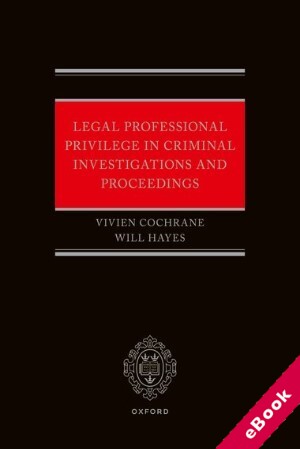We are now closed for the Christmas and New Year period, returning on Monday 5th January 2026. Orders placed during this time will be processed upon our return on 5th January.

The device(s) you use to access the eBook content must be authorized with an Adobe ID before you download the product otherwise it will fail to register correctly.
For further information see https://www.wildy.com/ebook-formats
Once the order is confirmed an automated e-mail will be sent to you to allow you to download the eBook.
All eBooks are supplied firm sale and cannot be returned. If you believe there is a fault with your eBook then contact us on ebooks@wildy.com and we will help in resolving the issue. This does not affect your statutory rights.
Legal Professional Privilege in Criminal Investigations and Proceedings concerns the law of legal professional privilege and its practical application in criminal cases and internal investigations, providing a single point of reference for all criminal practitioners regardless of the type of case in which they are involved.
Focused and structured around the practical issues that criminal lawyers encounter, the book examines each key stage in criminal proceedings and the issues that typically arise, such as at the police station and during an interview under caution, when gathering evidence for trial, and during the course of self-reporting to the authorities. Among the many issues discussed are the application of the crime-fraud exception in criminal proceedings, the effect on privilege of disclosing the reasons for advice to answer no comment, the relationship between privilege and powers of search and seizure, conducting privilege reviews, reference to privileged material in an expert's report, prosecution privilege and disclosure obligations, inadvertent waiver by lawyers at court, and appeals based on criticism of previous legal representatives and fresh evidence. The authors also offer guidance and analysis on the extent to which privilege can apply to internal investigations, including witness interviews and fact-finding reports.
Legal Professional Privilege in Criminal Investigations and Proceedings will provide vital guidance for criminal defence lawyers - both solicitors and barristers - as well as those involved in the criminal justice system more widely, including prosecution lawyers, investigators, independent counsel undertaking privilege reviews, and members of the judiciary who are asked to determine privilege issues in criminal proceedings.